The Connection Between Family Therapy and Stress Reduction in Recovery

Understanding the Vital Role of Family in the Recovery Journey
Recovery from mental illness or addiction is a complex process that extends beyond the individual. Family therapy emerges as a pivotal approach, emphasizing the interconnectedness of family members and the system as a whole. This article explores how family therapy supports stress reduction in recovery, highlighting its principles, techniques, and profound impact on long-term well-being.
The systemic foundation of family therapy in stress reduction
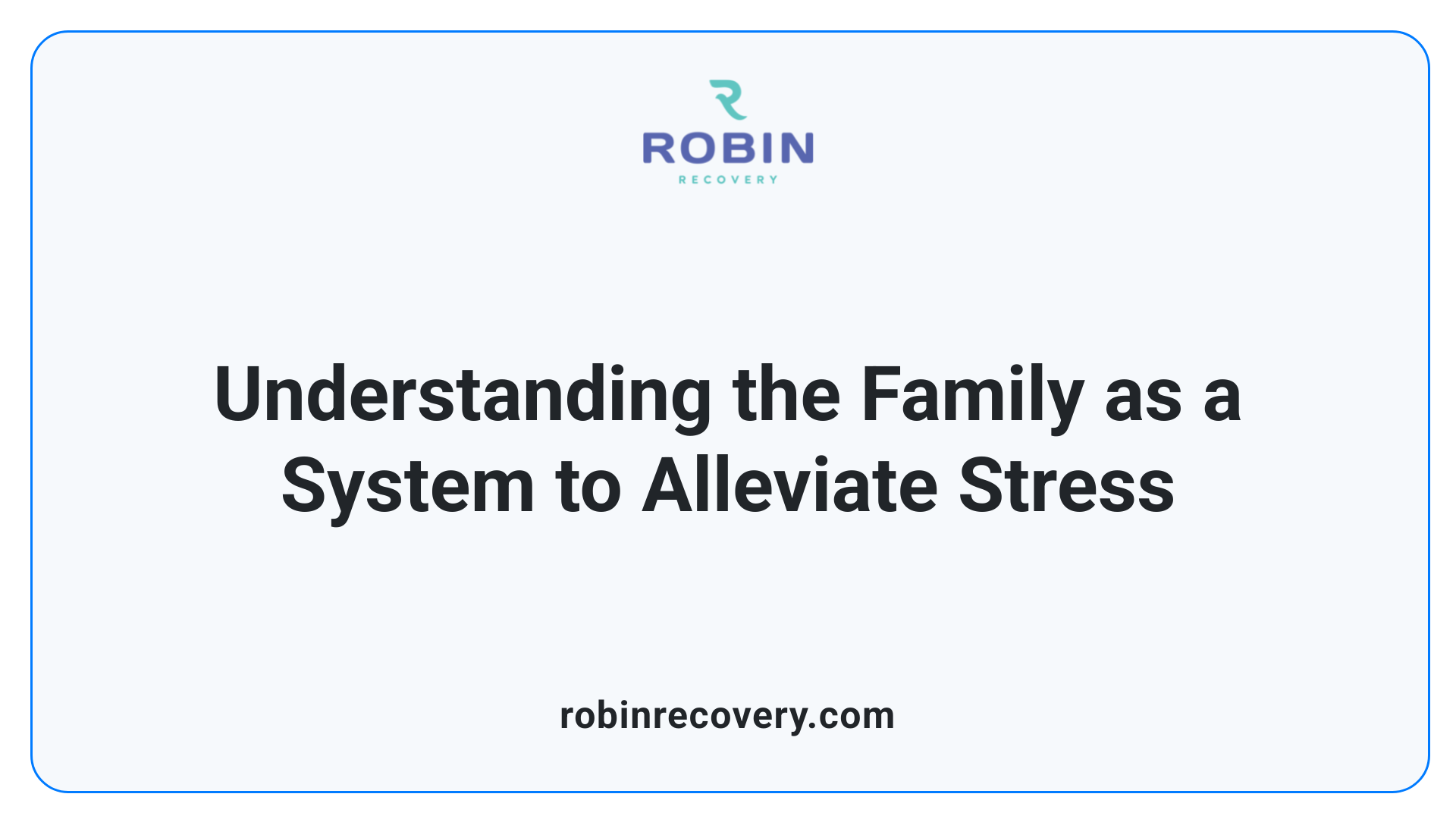
What is the role of family therapy in reducing stress during recovery from mental illness or addiction?
Family therapy is a vital component in managing stress during the recovery process from mental health issues or substance use disorders. It focuses on addressing the underlying family relationships and communication patterns that influence stress levels.
At its core, family therapy treats the family as a system where each member's behavior and emotions are interconnected. When one part of this system changes, such as a family member adopting healthier coping strategies, it creates ripple effects that benefit all members.
This systemic view allows therapists to identify and modify unhealthy interaction patterns like enabling behaviors, conflicts, or poor communication that may heighten stress. By improving these dynamics, families can create a more supportive and understanding environment.
Family therapy also works on rebuilding trust and fostering open, honest communication. These elements are crucial in reducing misunderstandings and emotional tension, which can otherwise contribute to relapse or emotional crises.
Interventions often include developing problem-solving skills, setting healthy boundaries, and encouraging mutual support. These strategies empower family members to handle stress more effectively, directly supporting recovery.
Typically, family therapy is introduced after the individual in recovery has shown some progress. This timing ensures stability and allows families to focus on healing both the person and their relationships.
In the end, this systemic approach not only alleviates family stress but also strengthens the entire family unit. It promotes resilience and emotional bonding, essential for long-term recovery and well-being.
Mechanisms and processes of family therapy in stress alleviation
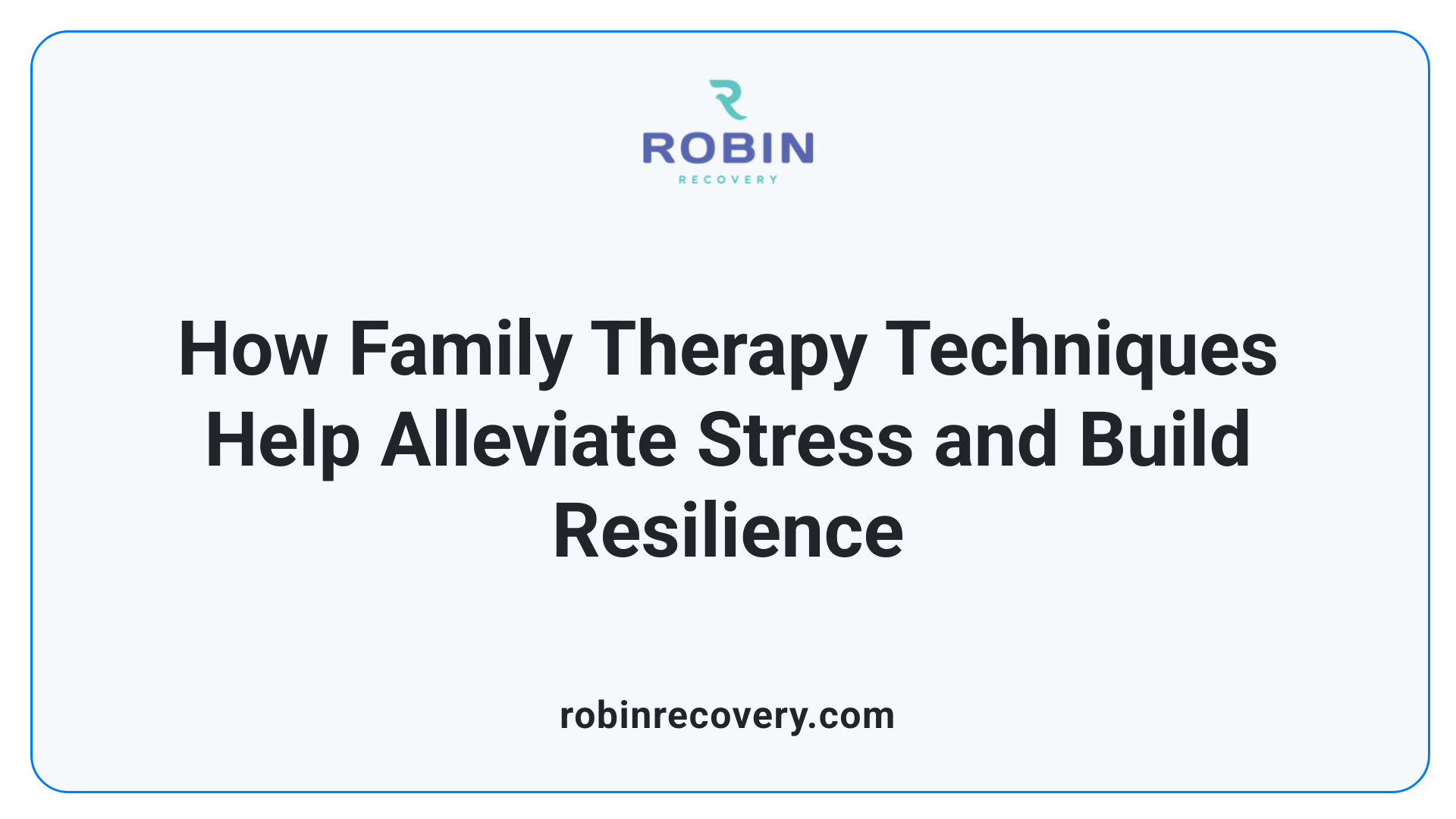
What are the core principles and techniques used in family therapy to alleviate stress in recovery contexts?
Family therapy applies a systemic approach that recognizes the family as a network of interconnected parts. One of its main goals is to improve the quality of communication among family members, which is often disrupted during stressful periods like recovery from mental illness or substance use disorder.
Fundamental techniques include psychoeducation, where family members learn about the nature of mental health conditions or addiction. This reduces stigma and misconceptions, fostering understanding and empathy. Communication exercises such as active listening and reflecting feelings help clarify emotional needs and reduce misunderstandings.
Role-playing and genograms are often used to explore family dynamics and identify patterns contributing to stress or enabling behaviors. Systemic interventions, such as structural or strategic family therapy, aim to alter interaction patterns that may perpetuate conflict.
Creating healthy boundaries is another vital process. This helps manage co-dependencies and reduces role confusion, thereby lowering relational tension. Therapists promote fostering empathy and emotional support, which are crucial for rebuilding trust and stability.
Tailored approaches incorporate cognitive-behavioral and behavioral management techniques to support emotional regulation. These strategies help family members develop healthier responses to stressors and create a more supportive recovery environment.
Overall, family therapy enhances relational understanding and promotes collaboration, effectively reducing familial stress and supporting individual recovery efforts. It provides a structured space for addressing conflicts, strengthening bonds, and establishing supportive routines that contribute to long-term well-being.
Family involvement and its impact on stress management
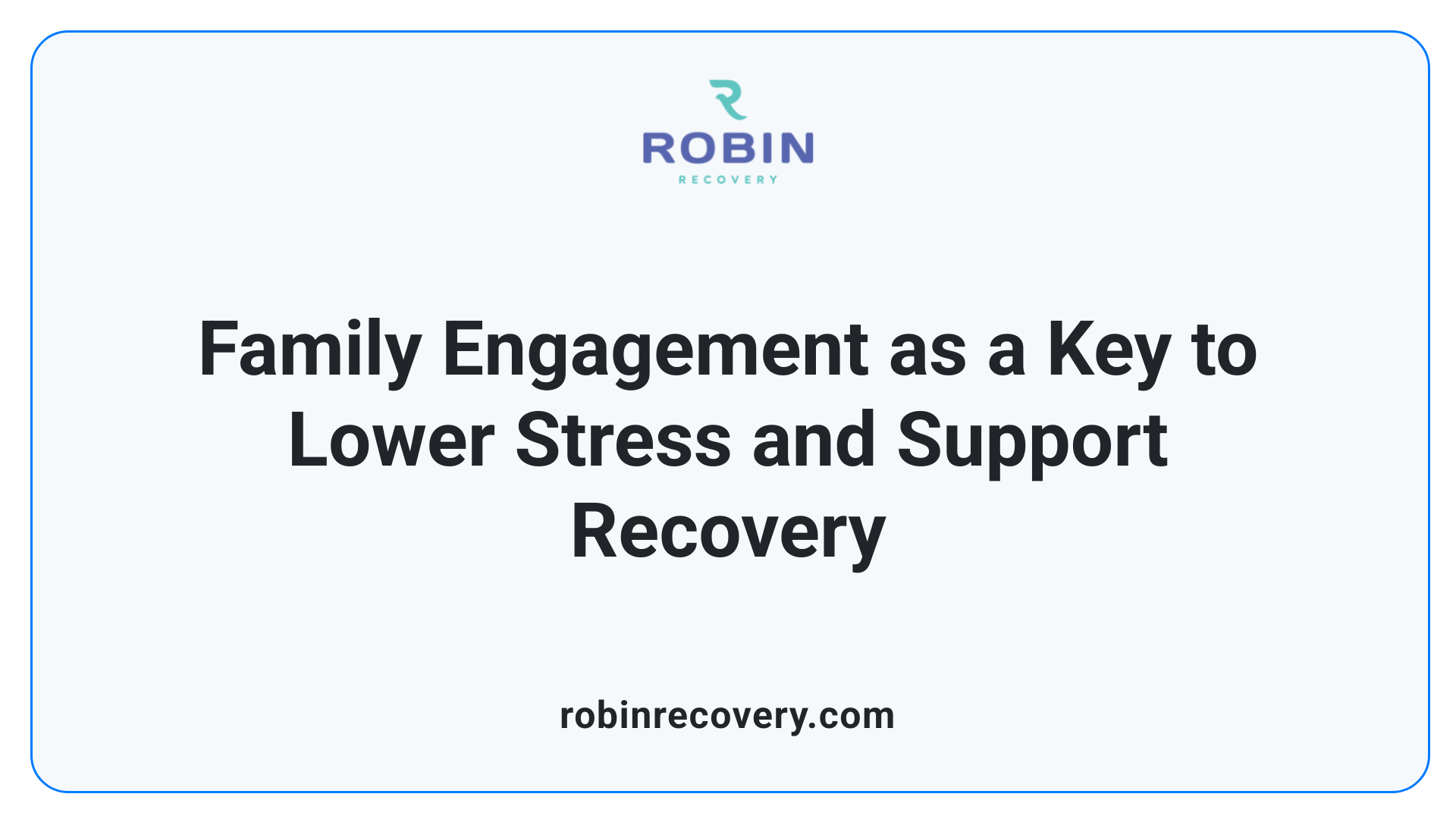
How does family involvement contribute to stress reduction in the recovery process?
Family involvement plays a crucial role in easing stress for individuals undergoing recovery from mental health issues or addiction. When family members actively participate in supportive roles, they provide emotional stability and encouragement that fosters a sense of belonging. This support helps individuals feel less isolated and more connected to a network of care.
Open communication within the family creates a safe space for sharing feelings, asking for help, and discussing challenges. Such transparency reduces misunderstandings and emotional tension, making stressful situations more manageable. Family therapy and education enhance understanding of mental health conditions and addiction, empowering family members to respond appropriately and compassionately.
Moreover, family support boosts motivation and self-esteem by recognizing progress and reinforcing positive behaviors. Celebrating recovery milestones together encourages continued effort and resilience.
Family involvement also includes establishing healthy boundaries, addressing enabling behaviors, and working collaboratively on problem-solving strategies. These actions promote a healthier family dynamic, which can lower overall family stress.
Research indicates that when families are engaged through therapy and shared caregiving, treatment retention improves, and the risk of relapse decreases. This collective effort helps create a more supportive environment, reducing the emotional burden many face during recovery.
In summary, family involvement nurtures emotional security, fosters honest dialogue, and reinforces motivation, all of which contribute significantly to managing stress and promoting successful recovery.
Principles and techniques for stress alleviation in family therapy
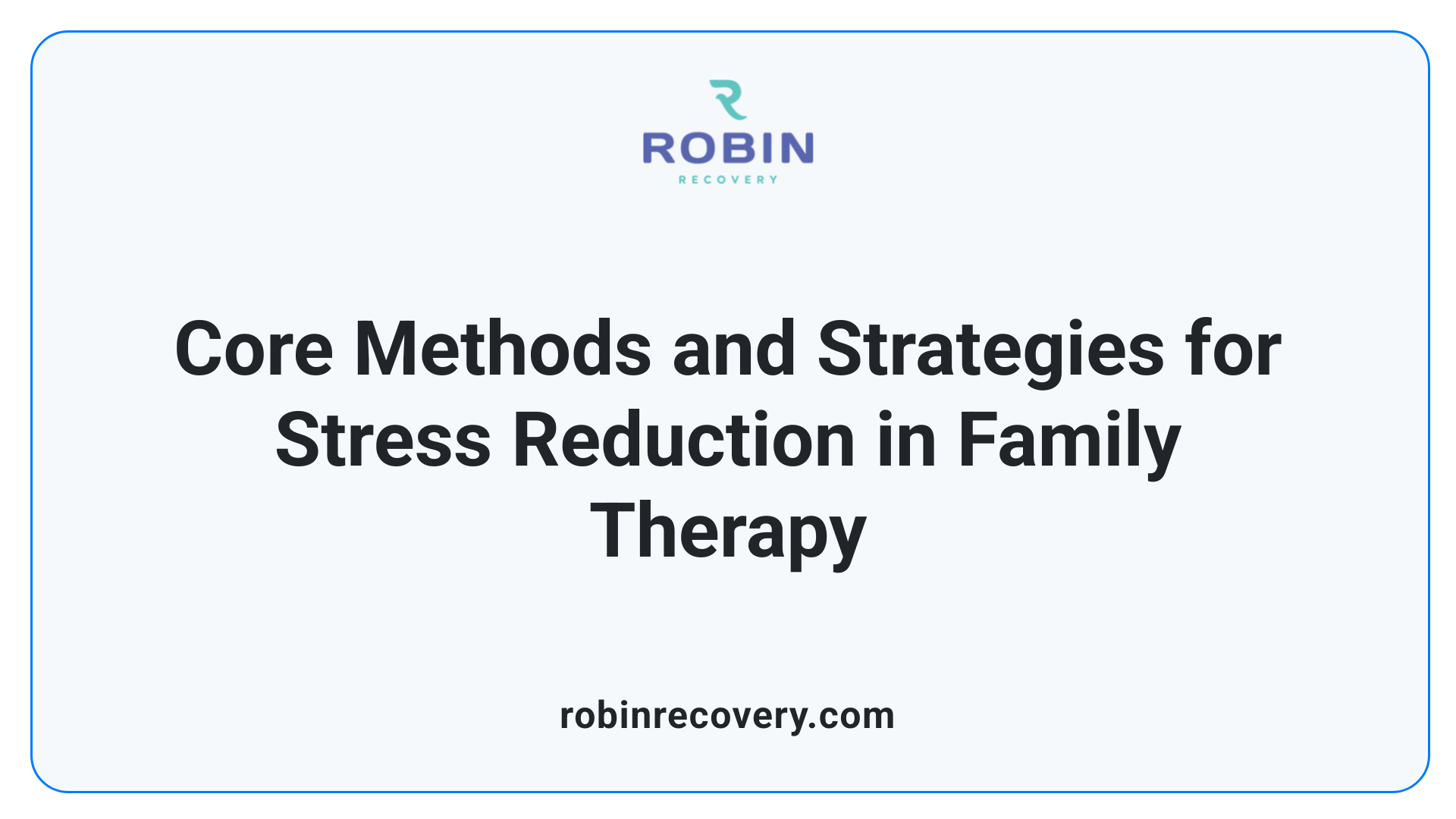
What are the core principles and techniques used in family therapy to alleviate stress in recovery contexts?
Family therapy plays a vital role in reducing stress during recovery by focusing on strengthening relationships, enhancing communication, and changing maladaptive patterns within the family system.
One fundamental principle is the belief that a family functions as an interconnected system, where a change in one part influences the entire family. Therapists employ systemic interventions such as structural or strategic therapy to identify and modify dysfunctional interactions.
Techniques like psychoeducation provide family members with a better understanding of mental health conditions or addiction, which can dispel misconceptions and reduce stress. Communication exercises, including reflective listening and conflict resolution strategies, facilitate honest and empathetic dialogue.
Role-playing and genograms help families recognize patterns and understand relational dynamics more deeply. These exercises promote awareness and empathy, helping members see from each other's perspectives.
Goals such as establishing healthy boundaries and fostering empathy are central to creating a supportive environment. Healthy boundaries protect individual space and reduce conflicts, while empathy-building encourages understanding and emotional support.
Therapists tailor approaches to individual family needs, integrating cognitive-behavioral techniques and behavioral management to aid emotional regulation and stress management.
Overall, these collaborative methods aim to resolve conflicts, improve relational stability, and create a nurturing atmosphere that mitigates relational stress.
Technique Purpose Example Psychoeducation Increase understanding of mental health/addiction Explaining how addiction affects the family Communication exercises Enhance listening and expression Reflective listening practice Role-playing Practice new interaction patterns Rehearsing conflict resolution scenarios Genograms Visualize relational patterns Mapping family history and roles Systemic interventions Change maladaptive interactions Structural or strategic family therapy techniques Boundary setting Establish healthy limits Clarifying roles and personal space Empathy-building Foster understanding and compassion Sharing personal stories
Creating a safe, collaborative environment through these methods reduces relational tensions, supports emotional regulation, and ultimately alleviates stress. Tailored family counseling fosters resilience and promotes long-term recovery.
Impact of family therapy on recovery outcomes and stress management
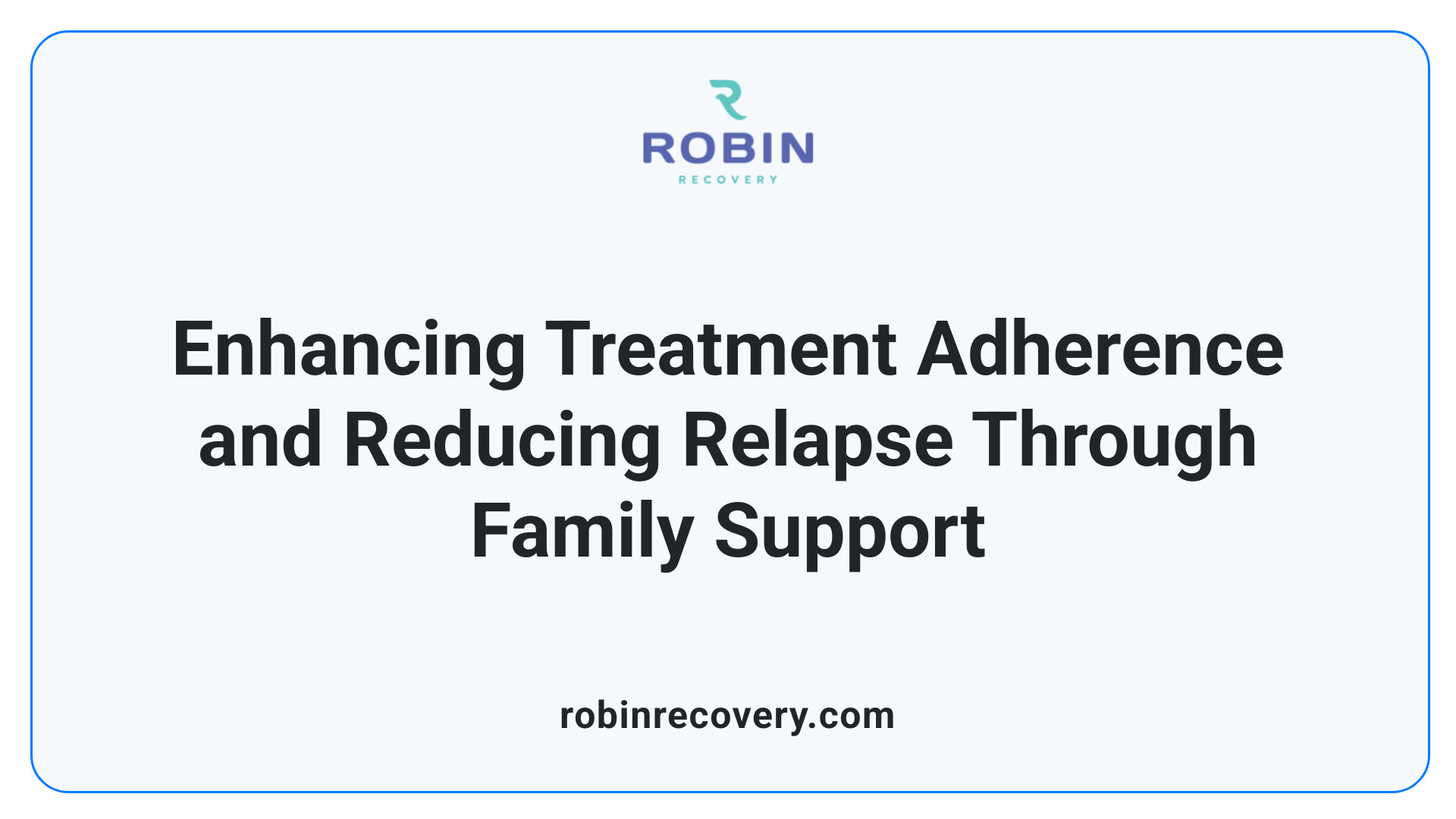
How does family therapy improve treatment adherence?
Family therapy plays a vital role in increasing treatment adherence for individuals with mental health issues and substance use disorders. By involving family members, therapy helps create a structured and supportive environment that encourages that person to stick with their treatment plans. Educating families about addiction and mental health reduces misunderstandings and stigma, which can otherwise interfere with recovery efforts.
Family members learn coping strategies, how to support without enabling, and ways to help monitor progress. Regular sessions promote accountability and motivate individuals to stay engaged with their therapy or medication routines. Strengthening communication within the family also ensures that concerns or early signs of setbacks are addressed promptly, helping to sustain long-term recovery.
What impact does family therapy have on relapse prevention?
Research shows that family therapy significantly reduces the risk of relapse by addressing the family dynamics that often contribute to substance misuse or emotional distress. It helps identify and modify enabling behaviors and unhealthy interaction patterns.
Therapeutic approaches such as Functional Family Therapy or Behavioral Couples Therapy focus on developing healthy boundaries, improving communication, and fostering a supportive home environment. This supportive network increases resilience and provides emotional stability, which are crucial for relapse prevention.
Families are also educated on common triggers and relapse warning signs. Such knowledge allows family members to recognize early distress signals and intervene with appropriate support or seek professional help, thereby breaking the cycle of relapse.
How does enhanced family support contribute to recovery?
Strong family support is fundamental in fostering a safe and encouraging environment for recovery. Family therapy helps build this support by nurturing open communication, empathy, and understanding.
By actively participating in the treatment process, family members can offer unwavering emotional encouragement, boost self-esteem, and motivate those in recovery. They also help to establish healthy routines, promoting stability and reducing stress in the household.
Moreover, therapy often involves psychoeducation about trauma, addiction, and mental health, which reduces misconceptions and fosters compassionate responses. Supportive families are better equipped to handle crises and emotional challenges, which contributes directly to lower stress levels.
Overview of family therapy’s role in recovery and stress management
Aspect Impact Details Treatment adherence Increased Families encourage participation and support consistent treatment plans Relapse prevention Reduced risk Addressing family patterns and triggers helps avoid setbacks Family support Strengthened bonds Open communication and education foster resilience
Family therapy integrates these elements to create a holistic approach to recovery. It not only assists individuals in managing their condition but also alleviates the stress experienced by families, resulting in healthier, more supportive environments that promote long-term well-being.
Holistic approaches integrating family therapy into recovery programs
How does family therapy fit into comprehensive recovery programs to maximize stress reduction?
Family therapy is a vital component of broad recovery strategies, including Intensive Outpatient Programs (IOP), Partial Hospitalization Programs (PHP), residential, and inpatient treatments. These programs recognize that emotional, psychological, and relational health are interconnected aspects of recovery.
This approach involves sessions where family members work together with therapists to improve communication, resolve conflicts, and rebuild trust. Such improvements foster a supportive environment, essential for maintaining sobriety and managing stress.
Family therapy also serves as an important platform for trauma and emotional healing. It helps families process grief, emotional pain, and unresolved issues that may contribute to relapse risks.
Furthermore, these systemic interventions help build resilience by equipping families with coping strategies and stress management techniques. They teach members how to support each other, handle triggers, and develop healthy boundaries.
By integrating family therapy into individual treatment plans, these programs enhance overall stability. The combined approach boosts adherence to medication, reduces relapse chances, and supports long-term recovery goals.
This holistic perspective ensures that recovery is not only about the individual but also about strengthening family bonds and resilience, creating a durable foundation for sustained health and stress reduction.
Treatment Level Role of Family Therapy Focus Area Additional Benefits IOP / PHP / Residential Addresses emotional and relational health Communication, conflict resolution Supports trauma healing, relapse prevention Inpatient Stabilizes family dynamics during crisis Building resilience Reinforces support networks, stress management Comprehensive Programs Systemic intervention for overall well-being Family education, boundary setting Enhances treatment adherence, long-term stability
Understanding how family therapy functions across different treatment programs highlights its importance in fostering resilience and reducing stress, ultimately supporting recovery from mental health issues and addiction.
The Power of Family Support in Long-Term Recovery
Family therapy is a vital component in the recovery landscape, providing essential tools and support systems that reduce stress and promote resilience. By addressing family dynamics, fostering open communication, and teaching coping strategies, family therapy helps create a stable and supportive environment. This holistic approach not only enhances treatment adherence but also bridges the gap between individual recovery and familial healing, leading to more sustainable mental health and addiction outcomes. Involving the family constructively in the recovery process underscores the profound connection between healthy relationships and effective stress management, emphasizing that healing is often a collective journey.
References
- The Role of Family Therapy in Recovery - CT Addiction Medicine
- Chapter 3—Family Counseling Approaches - NCBI
- How Family Therapy Strengthens Relationships & Supports Healing
- The Importance of Family Support in Addiction Recovery
- Why Family Therapy for Addiction Matters - The Berman Center
- [Box], Exhibit 1.3. Benefts and Challenges of Family Counseling in ...
- [PDF] Family Therapy Can Help - SAMHSA Library
- How Couples & Family Therapy Supports Your Recovery
- Benefits of Family Therapy for Addiction Recovery
